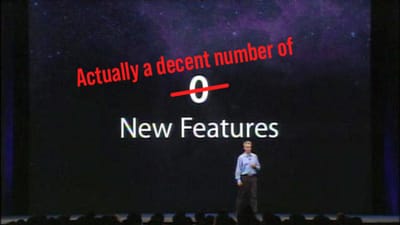Why do these YouTubers keep talking about video editing?
I saw a post on Threads recently that is of a general genre of conversation I see on a regular basis. The first post was:
Just going on purely laptop tech reviews you would think 90% of the US population were employed as video editors.
Which got the reply:
You are right. We need non-reviewers to do reviews
To which I said:
The ironic thing would be once you have those people trained up on how to do video production, suddenly they’ll be talking about the video editing performance as well 😂
It's ultimately a tricky thing — people want to watch reviews of computers, they want those videos to be well researched and relatively nicely produced, and they say they want them from non-reviewers or people who don't do video production. Well, the problem is pretty obvious, and let's go through the timeline of someone who decides they want to give the people what they want.
- I'm not a reviewer or video guy, but I did get this new computer, I'll make a video review!
- I don't really know what I'm doing, so I need to learn some basic video editing skills.
- I put out my review and a few people who see it. Maybe I'm lucky and many people see it, but then they mention all the things I didn't talk about in the review.
- I need to get better at this.
- I learn more about video production.
- I learn more about writing reviews.
- I do more reviews and more videos.
- I'm doing a lot of video work, so it's natural for me to talk about video work in my reviews.
- OMG I've turned into a reviewer and people want someone else now.
I think a few things are going on here. One, people underestimate how hard it is to review products well, and they do value reviewers who have done a ton of them to hone their craft, even if they don’t realize it. These experienced critics are able to figure out what to talk about and what people are going to be interested in, which is not something that comes naturally to almost anyone. Go ask your significant other or a non-techie friend to review their current laptop and see if they hit all the points you'd want to know as a buyer. I'm guessing they won't. It might be interesting and even useful feedback, but I'd be shocked if they dig into the data and comparisons you want from a formal review.
Two, people like to say that they want to see someone use a computer that's not doing video production. As shown in the 9 steps above, once you start doing video reviews of products, you naturally end up being a video editor.
Three, the simple truth is that any new computer can do basically anyone's job just fine today. So many people who do their work from a computer are using web apps like Google Docs, Jira, and Gmail, none of which really let you see the difference in performance from one computer to another. Maybe a maxed out MacBook Pro that cost $4,000 can scroll a Miro board slightly smoother, but the odds are it will do just as well as a baseline MacBook Air. The differences in performance are better-displayed with intense workloads, and video editing happens to be a good one for this. I do agree it would be cool to see things like 3D rendering in Blender or other high end software I don't even know exists, but the fact of the matter is that high end software that pushes computers to their limits in 2024 are all niche things that are going to get people in the comments lamenting, "but I don't do that, this test isn't relevant to me!" If it's a remotely high end computer in 2024, it's going to do the things most people do great. If there are unexpected quirks, then the reviewer should note them, but if you want to know how much more performance a new computer gets, it's just gonna have to include some workflows that don't apply to everyone.
Finally, it is worth mentioning that video export times aren’t particularly useful general data since there is often custom silicon on the chip that accelerates that specific task. The challenge for reviewers is that the things most people do on their computers are simply not held up by the computer’s performance, and things like heat, battery life, and fan noise are more useful performance data for people. And yet I do find high-end performance tests in general to be useful because they help you know how long into the future you’ll be able to continue experiencing excellent performance. In theory, you could do a “long term review” of a laptop 4 years after a laptop releases, but (a) metrics show literally no one is going to watch that, and (b) who is that video review even for? People are generally buying new computers at that point so this review wouldn’t even be useful to them. They want to know about the newer devices.
in short, I wildly disagree with the assertion that professional reviewers provide little value compared to “real users”, but I do agree with the general idea that reviewers should test more than video editing and exporting to display the performance of new computers


